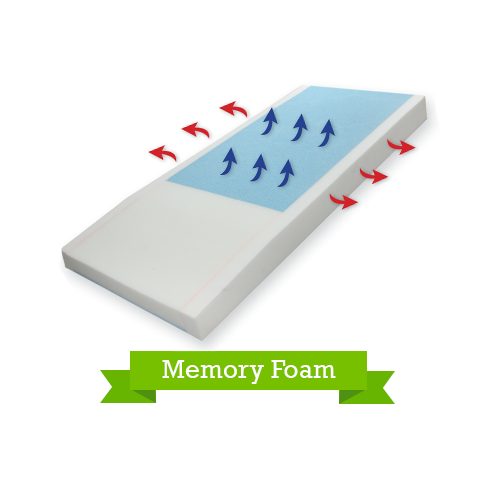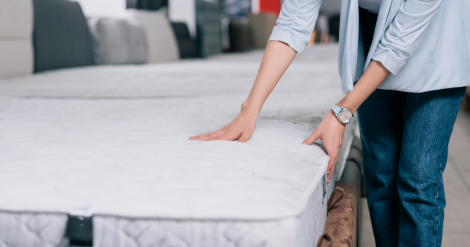No products in the cart.

Memory foam mattresses have gained a lot of customers and received positive feedback over the years for both medical and luxury purposes. While memory foam has earned satisfaction ratings of roughly 80%, many potential buyers are skeptical of switching to memory foam for the first time. Hesitation often stems from users being accustomed to sleeping on a firm spring mattress, and switching mattress systems provokes concern that sleep conditions may potentially get worse rather than better. While a considerable amount of people do still prefer a firm mattress, there are 4 leading benefits to consider when evaluating whether or not you are a good candidate for the switch to a memory foam mattress.
Top 4 Benefits of Memory Foam Mattresses:
- Spine and/or Joint Support: For those who experience chronic back and/or joint pain, the conforming sleep surface allows the spine and body to rest naturally without imposing a linear posture. For many users, this can relieve the majority of the body’s stress and tension experienced during the day by reducing it at night.
- Pressure Redistribution/Prevention: The body’s weight on heavier pressure points can impact everyone differently. Some common pressure points are on the hips, shoulders, lower back, ankles, and elbows. For less severe cases, pressure points may increase the amount of tossing and turning one does in the night. However, pressure points can be as serious as bedsores and pressure ulcers for many users, in which case a mattress that redistributes pressure is critical.
- Motion Isolation: Movement is a common cause of sleep disruption amongst sleeping partners. The inevitable tossing and turning on a memory foam mattress will not be transferred from one partner to the other unlike any other sleep surface.
- Lifespan: A high quality memory foam mattress is on average expected to be more durable and outlive a spring mattress. Most memory foam mattresses have a lifespan upwards of 10 years, many of which have warranties extending to roughly 8-10 years depending on the brand.
Manufacturers will reiterate that memory foam is not a perfect fit for all, and some users simply cannot adapt or do not prefer the sleep surface. This is more common amongst users who are considering the mattress for luxury purposes. However, more often than not, people are avoiding switching to memory foam because it is unfamiliar and are not receiving the health benefits that they need. As stated above, for those that did switch to memory foam, 4/5 people were satisfied with the switch and saw improvements. If you are someone that is hesitant to switching to memory foam and would benefit from the health advantages, it is highly recommended you try the switch to memory foam.
You might also be interested in:

-
/
Rest for Success: When to Bid Adieu to Your Old Mattress
Rest for Success: When to Bid Adieu to Your Old Mattress We spend about a third of our lives in bed, and the quality of our sleep directly impacts our overall well-being. One often overlooked factor in achieving a good night’s sleep is the condition of our mattress. As the years go by, our faithful […]
Read more
Unveiling the Truth: Busting Common Mattress Myths
Unveiling the Truth: Busting Common Mattress Myths A good night’s sleep is crucial for overall well-being, and the right mattress plays a pivotal role in achieving that. However, amidst the quest for the perfect mattress, numerous misconceptions have caused mattress shoppers confusion when searching for the right mattress. Our latest blog unravels the truth behind […]
Read more
-
/
How Medical Bed Mattresses Aid in Post-Surgery Recovery
How Medical Bed Mattresses Aid in Post-Surgery Recovery Surgery can be a daunting experience, regardless of its nature or severity. The period following a surgical procedure, known as post-surgery recovery, is crucial for achieving the best possible outcome. While factors like rest, nutrition and pain management are widely acknowledged as vital, the role that medical […]
Read more
-
/
Meeting Medical Mattress Quality Standards
Meeting Medical Mattress Quality Standards Medical mattresses are designed to meet specific quality standards to ensure patient safety, comfort and hygiene. These standards are established to address the unique needs of healthcare environments as well as the patients utilizing these mattresses. Some key quality standards for medical mattresses include: Infection Control Standards Water […]
Read more